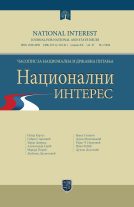- Home page
- Researchers
- Zoran Krstić
Zoran Krstić
Faculty of Political Sciences, University of Belgrade

PERSPECTIVES OF SERBIAN-ALBANIAN RELATIONS IN THE LIGHT OF THE "OPEN BALKANS" INITIATIVE
The paper aims to show the possibilities and perspectives of improving Serbian-Albanian relations through the establishment of the “Open Balkans” project. Confrontation policies enabled the creation of inter-ethnic intolerance and provided support to political elites, leading these societies in the direction of conflicts and rejection of mutual cooperation. In the era when Serbia and Albania are trying to become part of the European Union, there are numerous obstacles and a lack of support from European countries on this path. Accordingly, these countries initiated regional political and economic integration. “Open Balkans” was designed as an initiative of the countries of the Western Balkans with the aim of advancing these countries on the European path. Part of the criticism of this project is reflected in the expectation of help from the countries of the European Union, which was absent in the original processes of European integration. This initiative represents a mini-precedent in the European history of integration and is the way to restore friendly Serbian-Albanian relations. “Open Balkans” should open a new economic space for cooperation between Serbian and Albanian economies, help overcome inter-ethnic prejudices and create preconditions for faster adoption of European values.

THE RETURN OF THE PINK TIDE AND THE LEFT TURN: LA NUEVA IZQUIERDA IN LATIN AMERICA
The subject of study in this paper is the return and rise of the new left in the elections held in the previous four years in Latin America. The focus of the research is on the causes and consequences of the return of the pink tide and its basic characteristics. The main goal of this paper is to objectively look at the problems and difficulties faced by the states of the region in the context of the cyclical change of leftist and rightist policies. Special attention in the work is devoted to the analysis of factors that helped or hindered the institutionalization of left-wing policies. Part of the work is focused on the analysis of the relationship between new social movements and the state, as well as on economic dependence and exploitation of natural resources. The return of the leftist wave is a reaction to the increased economic and social inequalities that led to a series of protests and riots and the emergence of various social movements. The problem in Latin America is that the region faces not only underdevelopment but also a structural crisis of credibility in democratic and political systems. The paper uses a historical-descriptive and contextual approach in the analysis of the "pink tide" phenomenon.
